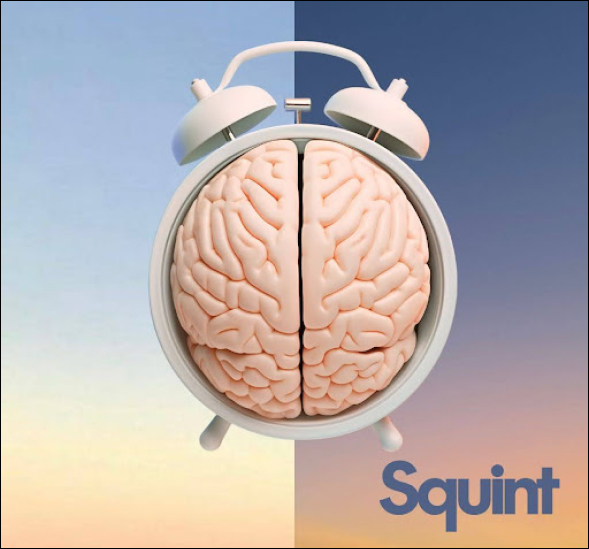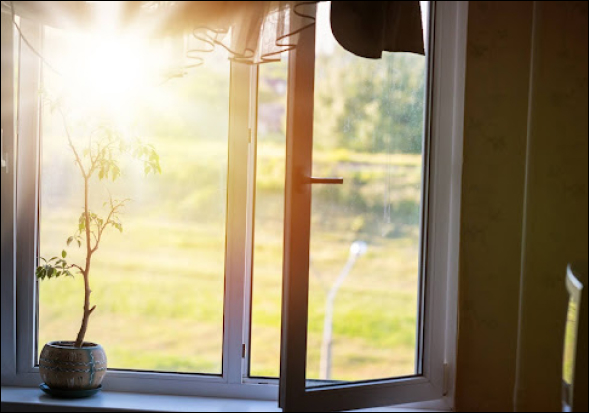What makes us tick?
You guessed it—a clock. We run on clocks. We always have. The existence of our clock genes was acknowledged with a Nobel prize in 2017, given to three scientists who confirmed how our circadian clock anticipates and adapts our physiology to the different phases of the day. Every operation of our body – metabolism, hormones, immunity, sleep, digestion, mood, energy – all depend on our clocks working properly.
In other words: If you aren’t taking your circadian rhythm seriously, you aren’t taking your health seriously.
Let’s take a Squint.


An Ancient Rhythm is Inside You
Circadian rhythm isn’t just a new Nobel prize-winning concept. The circadian masterstroke of our bodies has been around for a long time. Circadian rhythms are ancient mechanisms of mammals, including humans, conserved through evolution. We have always lived by the cycles of nature: the changing seasons, the balance of the tides, the lunar cycles.
We’ve adapted and thrived as we’ve evolved by understanding and respecting these cycles.
Today, Nobel prize winners are telling us we should be paying much closer attention to our 24-hour cycle in particular – our circadian rhythm. We need to wake, eat, work, move, rest, and sleep, all while keeping in mind the daily rhythms of light and dark. When our bodies work closely and collaboratively with the sunlight and darkness of our natural environment, we work well.

Consistent Light
What happens when we don’t follow nature’s 24-hour cycle? We get sick. Reviews of the literature reveal that there is an emerging link between a broken circadian clock and depression, immunity, diabetes, neurodegenerative disease and nearly every type of cancer.
The truth is, if you don’t feel well, there is an excellent chance your circadian rhythm is out of sync.
In fact, our body is designed to receive a consistent daily dose of full-spectrum sunlight. Yet, we are spending most of our days living inside. Our indoor lifestyles are void of natural sunlight, which means we are missing important signals and healthy light frequencies our internal clocks need to help us tell time.
But my Apple watch keeps perfect time?
Unfortunately, that’s not the clock our body uses. Our body can’t tell time unless we experience daytime light and nighttime darkness. If you feel like your body is off, it’s likely your circadian rhythm is off. We already know that jet lag kicks our butts. Our indoor living – combined with artificial light at night – is doing the same thing to us on a daily basis (without the benefit of frequent flier miles).
Many of us don’t feel well, don’t have enough energy, and are getting sick. You may be switching up your food, trying juice cleanses, stacking supplements, but what the research is telling us is that we need to have a better light diet. Circadian clocks help to regulate our sleep patterns, feeding behavior, hormone release, blood pressure and body temperature. It’s the foundation of health that supersedes anything you might be reading about “how to get healthy.”

A New Rhythm
Without proper light signals, your body systems will suffer, including your hormones (ladies and gentlemen). Our circadian rhythm genes control immune cell gene expression and function, regulate our hormones, and determine the path of disease.
To get back in rhythm, you need to reset your clocks. A strong circadian rhythm starts with the first light of the day and ends with darkness at night. Morning light tells the brain that the day has begun and signals all the other cells in the body that it is time to do their jobs. Darkness at night signals your body that it is time to rest and repair. The more consistent light/dark/light/dark 24-hour sequences you can put together, the better your health will be.
As we Squint further, we will learn how the light of the sun perfectly directs our body to be its healthiest self. The sun is where you start getting your health back. It’s the “Before You Begin” of whatever user manual you are following. Daily light routines – the Squintessentials – will help you easily reconnect with this critical source of health and wellness.
Try these tips for getting back on track:
Remember, light is the most potent external factor that influences our circadian rhythm. Get as much natural sunlight during the day as possible and reduce as much artificial light exposure at night. That means no more doom scrolling.
Thank you for taking a Squint with us! Don’t forget to print out our Circadian Rhythm checklist to stay on top of your light routine.


